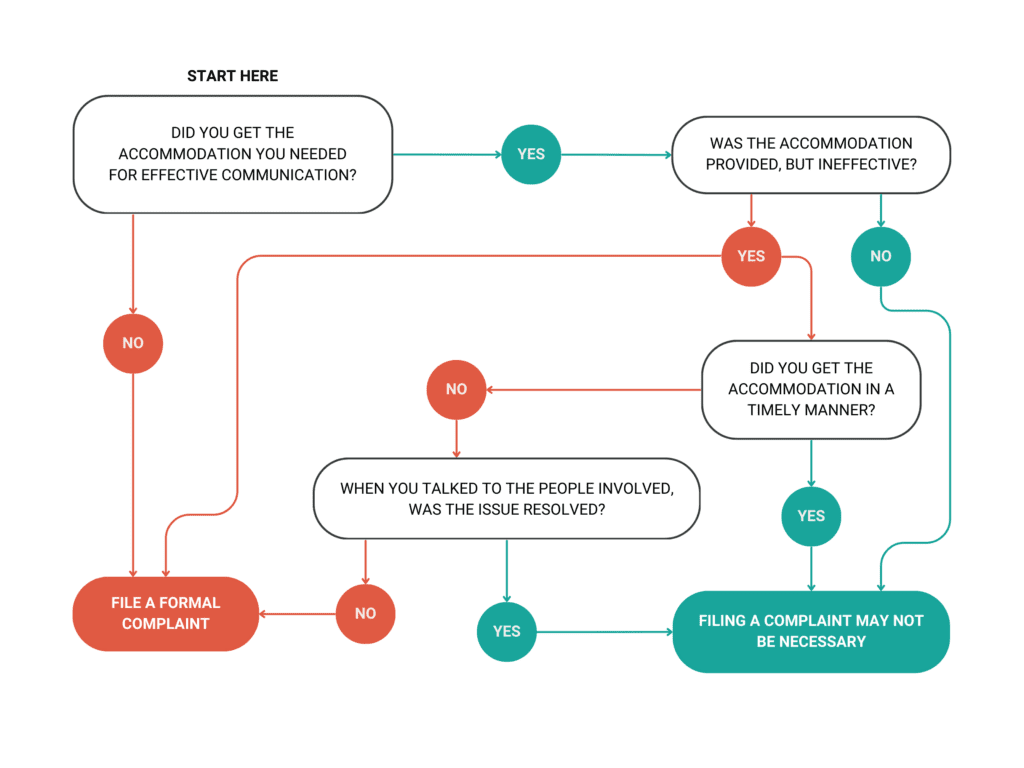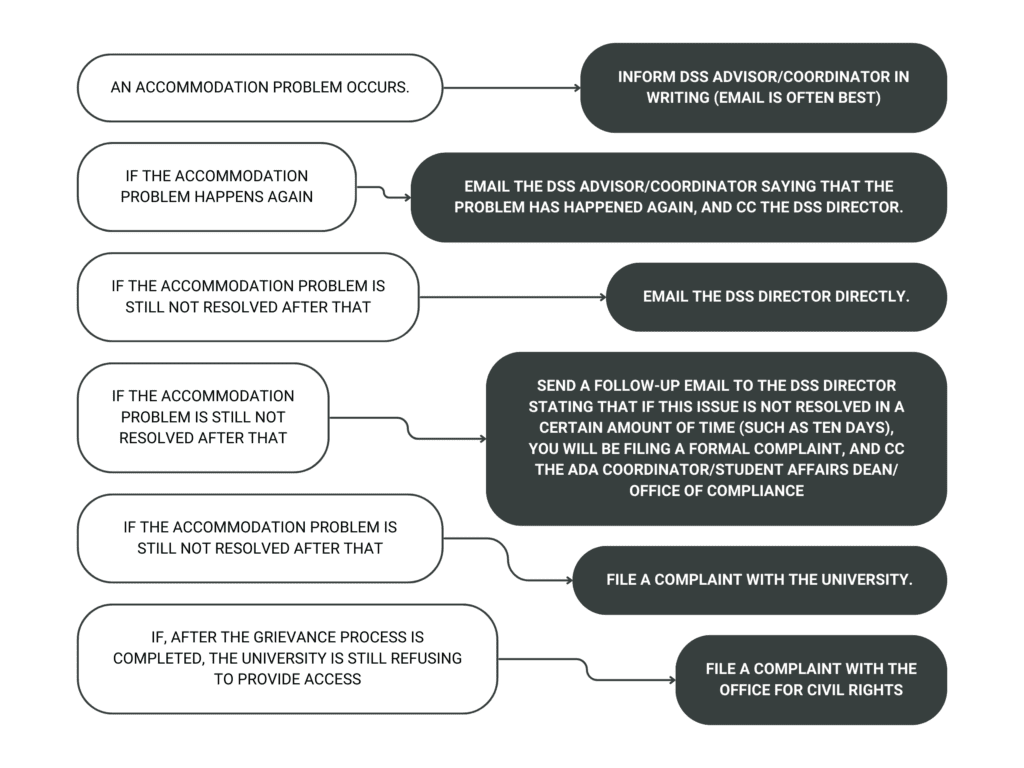Home » Resources » Access & Accommodations » Laws & Compliance » How to File a Complaint
How to File a Complaint
Getting effective accommodations should be a smooth process. You make the request, the accommodations are provided, and the accommodations work for you. But sometimes, the process is not smooth, and you don’t get what you need. As a deaf student, you have the right to file a complaint (sometimes called a grievance) if you do not receive effective accommodations.
Often your concerns can be addressed by having a conversation with the people involved (for example, an instructor or interpreter) or the person responsible for accessibility (for example, a Disability Services professional). But if you can’t resolve the problem even after having this kind of conversation, sometimes you will need to go ahead and file a formal complaint (this is sometimes called starting the grievance process).
When Should I File a Formal Complaint?
For example, imagine that you requested an ASL interpreter for a highly technical class, but the interpreter provided for that class is unfamiliar with the signs needed for that class and is often confused and behind. You inform your university’s Disability Student Services (DSS) office that the ASL interpreter is not providing access to the class because of these problems. But DSS tells you that the interpreter is qualified and will continue to interpret for this class. In this case, even though you talked to someone who should have solved the problem, they did not do so, and it is appropriate to file a complaint.
How Do I Start the Grievance Process?
There are two possible paths for filing a complaint or beginning the grievance process. You may file a complaint with your school, or with the Office for Civil Rights (OCR). You may also choose to begin the grievance process at both places at the same time.
Colleges and Universities
Begin by reviewing the school’s policy on how to file a complaint. Most colleges and universities have information on their websites that explains their grievance procedure for problems related to accessibility and discrimination.
Each school has its own grievance procedure. You may begin the process with DSS, or you may need to go through an ADA Coordinator, Dean of Students, Legal Services/Compliance, or an Office of Equity and Diversity. This information should be available on your school’s website.
It is important to keep a written record of your attempts to resolve the problem. It is fine to start out addressing the problem by talking to the people involved in person, but as you move forward, you should transition to something that leaves a record. Each university has its own processes. It is important to research your university’s website and find out which process applies to you.
Here are some examples of how this might play out with different grievance processes.
Depending on a university’s operational structure, student complaints may be directed to their ADA coordinator, the office of compliance, or the student affairs dean.
Your interpreter is often late to class.
Tell the interpreter you are concerned and will be informing the DSS coordinator if it continues.
If it continues, tell the DSS coordinator.
If it still continues, email the DSS coordinator saying the issue is not resolved, and CC the DSS director.
If it still continues, email the DSS director directly saying the issue is not resolved.
If it still continues, send a follow-up email to the DSS director stating that if this issue is not resolved in one week, you will be filing a formal complaint. CC the ADA Coordinator on this email.
If it still continues, file a formal complaint with the ADA Coordinator.
Your professor refuses to wear a microphone.
Explain to your professor that wearing a microphone is required to receive the access accommodations you (have been or are) approved for.
If it continues, tell the DSS director.
If it still continues, email the DSS director saying that the issue is not resolved, and CC your university’s Office of Compliance.
If it still continues, send an email to the Office of Compliance saying that you will be filing a formal complaint if the issue is not resolved
If it still continues, file a formal complaint with the Office of Compliance.
If the Office of Compliance agrees with the professor and says he doesn’t have to wear a microphone, file a complaint with OCR.
A speech-to-text provider was promised but nobody shows up.
Tell the DSS coordinator that the speech-to-text provider did not show up for your class.
If it continues, email the DSS coordinator saying the issue is not resolved, and CC the DSS director.
If it still continues, email the DSS director directly saying the issue is not resolved.
If it still continues, send a follow-up email to the DSS director saying that the issue is not yet resolved, and CC the Student Affairs Dean.
If it still continues, contact the Student Affairs Dean directly.
If it still continues, file a formal complaint with the Student Affairs Dean.
Office of Civil Rights (OCR)
The Office for Civil Rights (OCR) is the oversight agency that handles complaints against educational institutions, such as colleges and universities. Its website can be a source of information about the grievance process.
Depending on your situation, you might choose to file a complaint with OCR before you file a complaint with your school, or at the same time. You are not required to file an internal grievance with your school first. Listed below are some options for when you may want to file a complaint with OCR:
- File a complaint against the institution directly with OCR (without going through an internal grievance first)
- File an internal grievance AND a complaint with OCR.
- File an OCR complaint after completing an internal grievance with the school.*
*Note: If you file a complaint with OCR, it must be within 180 days of the last act of discrimination. This means that it may be important to file a complaint with OCR even if the issue has not yet reached the end of the grievance process at your school.
Collect Documentation
Whether you are filing a complaint with a school or with OCR, it will be important to provide evidence of what went wrong. This could include that you didn’t receive an accommodation at all, that you received an accommodation but it was too late, or that you received an accommodation that was not effective. You may also need to show that you told the appropriate people at your university about the problem, but they still did not provide a resolution for your concern.
Have the following ready before you file your complaint:
- A clear statement of the problem.
- A clear statement of what needs to happen to solve the problem.
- A collection of emails you sent, requests you made, and any other documented communications or evidence.
- A timeline of when everything happened. (Timestamps on emails might be enough, but there may be some additional details you will need to fill in, such as the date that the service provider failed to show up.)
- A list of people who were involved in this problem. This could include service providers, DSS staff, and other university faculty and staff. Include contact information for each person.
When filing an internal grievance with your institution, you may want to find out what sort of timeline to expect, so you know when your complaint will be addressed. This may help you decide if and when you will want to take additional steps for resolution, such as working with a legal advocacy organization or filing a complaint with OCR.
What Are My Next Steps if My College or University Does Not Resolve the Issue?
Other Organizations that Can Provide Information, Resources & Support
Students can contact NDC for additional resources and guidance, in addition to the organizations below.
State Organizations
Every state has a disability rights organization that provides legal advocacy services for people with disabilities. Search the National Disability Rights Network list of state affiliates and contact them for legal guidance and support.
The ADA National Network
The ADA National Network has regional centers with ADA specialists who can provide information about access and accommodations under the law.
The National Association of the Deaf (NAD) Law and Advocacy Center
The National Association of the Deaf (NAD) Law and Advocacy Center has a legal team that addresses a wide range of civil rights concerns for deaf people around the country. They provide free support for routine inquiries, information, advocacy support, advice, and referrals. They also have the following resources:
Additional Resources
- Equitable Access Guide: Understanding Legal Responsibilities for Institutions
- Legal Overview – Video Playlist
- Office for Civil Rights: Auxiliary Aids and Services for Postsecondary Students with Disabilities
- Student Resource Portal
- Know Your Rights
- Preparing for College
- Requesting Accommodations
- Student FAQs







